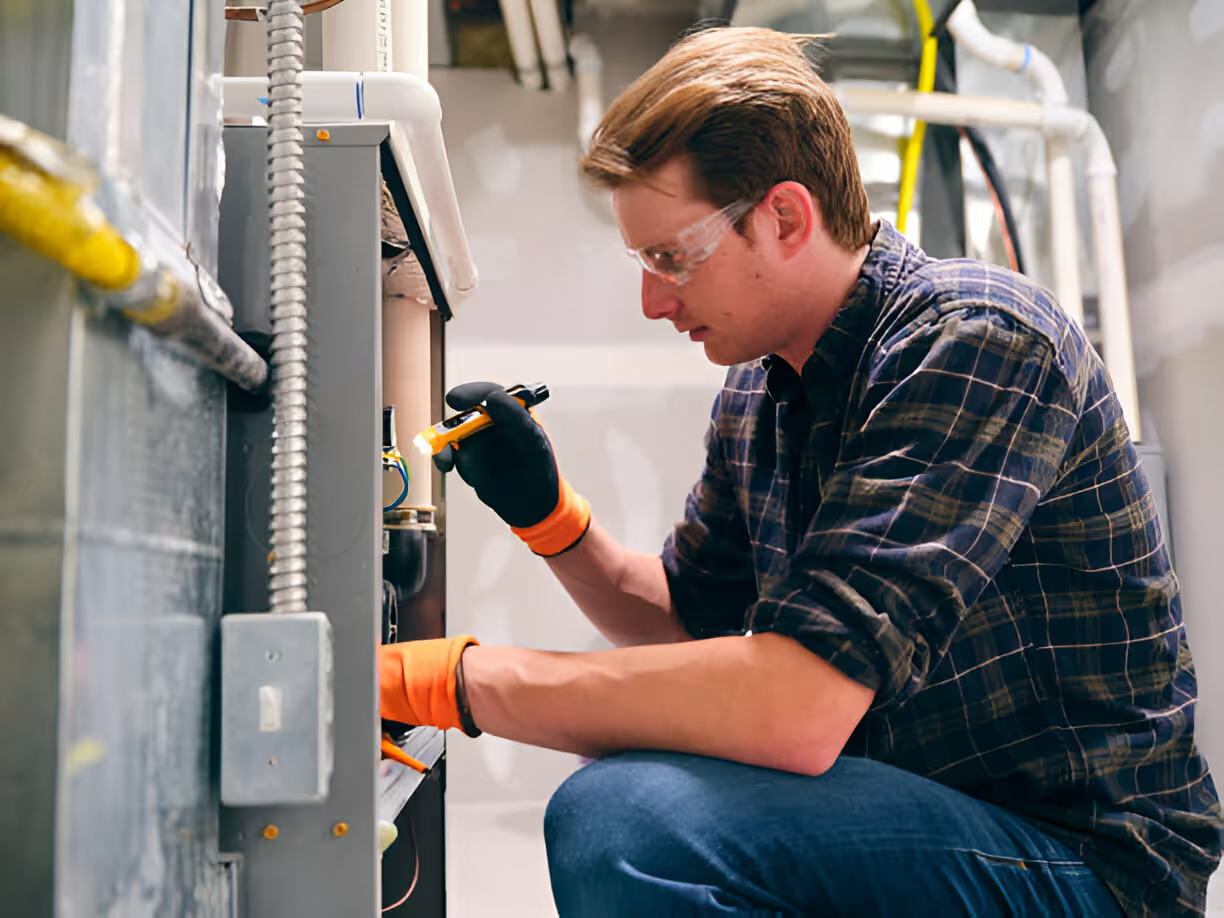Heating Tune-Up in Clearwater, FL


Why a focused heating tune-up matters in Clearwater, FL
- Coastal corrosion and salty air can accelerate wear on outdoor components and electrical connections.
- High humidity encourages dirt, pollen, and biological growth that reduce airflow and efficiency.
- Many homes use heat pumps as the primary heat source; heat-pump tune-ups require specific checks that differ from combustion furnace service.
- Preventive maintenance reduces the chance of a sudden failure during an unexpected cold front, when service demand rises.
Common heating systems and issues in Clearwater
- Heat pumps (air-source): refrigerant leaks, weak defrost cycle, reduced heating capacity.
- Electric strip heat/electric furnaces: high electrical draw, faulty contactors or elements.
- Gas furnaces (less common but present in some homes): burner misalignment, cracked heat exchangers, carbon monoxide risk.
- Ducted systems: restricted airflow from clogged filters, dirty coils, or duct leaks.
Inspection checklist — what technicians inspect and why
A complete heating tune-up focuses on controls, safety, and performance. Typical inspection items include:
- Controls and safety switches: Verify safe operation of limit switches, float switches, and other safeties that prevent system damage or hazards.
- Thermostat calibration and operation: Check setpoint accuracy and cycle behavior to ensure comfort and prevent short cycling.
- Burners and combustion components (for gas systems): Inspect burners for proper flame pattern and color, check ignition system, and confirm efficient combustion.
- Heat exchanger inspection (combustion systems): Visual and, where appropriate, more detailed inspection to detect cracks or corrosion that can leak carbon monoxide.
- Blower assembly and motor: Inspect motor bearings, belts, fan wheel balance, and measure airflow to confirm distribution and efficiency.
- Electrical connections and amperage: Tighten connections, test capacitors and contactors, measure current draw to spot failing components before they fail.
- Refrigerant and outdoor unit checks (heat pumps): Check refrigerant levels, inspect the reversing valve and defrost operation, and look for corrosion on coils and fins.
- Ductwork and filter condition: Inspect accessible ducts for debris and confirm filter size/condition for proper airflow.
Cleaning and minor adjustments performed
A tune-up includes targeted cleaning and small repairs that restore performance:
- Clean or replace air filters, clean blower wheel and housing where needed.
- Clean indoor coil (evaporator) and outdoor coil (condenser) to improve heat transfer.
- Remove debris from outdoor unit, straighten coil fins, and lubricate bearings if applicable.
- Adjust burner assembly and pilot/ignition timing on combustion systems.
- Tighten electrical connections, replace worn belts, and adjust blower speed where required.
- Apply anti-corrosion treatment recommendations for exposed fasteners and terminals affected by salt air when appropriate.
Performance and safety testing
Technicians validate results using diagnostic testing to quantify performance improvements and safety:
- Temperature rise and supply/return differential: Confirms the system is producing expected heat.
- Airflow measurements: Ensures adequate CFM for proper comfort and efficiency.
- Refrigerant pressure and superheat/subcooling (heat pumps): Detects leaks and confirms charge is correct.
- Electrical load testing: Verifies motors and compressors operate within safe amperage ranges.
- Combustion efficiency and carbon monoxide testing (combustion appliances): Measures flue gases and tests for CO to confirm safe operation.
- Defrost and reversing cycle checks (heat pumps): Ensures reliable transition and heating capability during cool, humid conditions.
Recommended frequency and maintenance plans
- Annual tune-up: Recommended for most systems — schedule before the cooler season (late fall) so any issues are resolved before demand increases.
- Twice yearly for older systems or heavy users: Older equipment, homes with known duct issues, or units with prior refrigerant or electrical concerns may benefit from biannual checks.
- Ongoing maintenance programs: Routine maintenance plans can include annual inspections, priority scheduling in peak seasons, and documentation of service history. Clear, upfront pricing and service scope help homeowners plan maintenance budgets while protecting system life and performance.
Benefits of professional heating maintenance in Clearwater, FL
- Improved efficiency and lower operating costs: Clean coils, correct refrigerant charge, and proper airflow reduce run time and energy waste.
- Reduced breakdown risk: Early detection of worn parts—motors, capacitors, belts, or burners—prevents inconvenient failures.
- Enhanced safety: Heat-exchanger inspections and carbon monoxide testing protect against dangerous combustion byproducts.
- Extended equipment life: Routine lubrication, cleaning, and adjustments reduce stress on components and delay costly replacements.
- Consistent comfort: Proper calibration and airflow management eliminate hot/cold spots and improve indoor humidity control during transitional seasons.
- Warranty compliance: Many manufacturers require documented annual maintenance to keep warranties valid.
What to expect during the tune-up visit
- Arrival and system review: Technician documents system model, age, and prior service notes.
- Visual inspection and safety checks: Primary focus on any immediate hazards such as gas leaks or electrical shorts.
- System cleaning and adjustments: Filters, coils, burners, and blower servicing performed as needed.
- Diagnostic testing: Measurements recorded for airflow, temperatures, refrigerant pressures, CO levels (if applicable), and electrical load.
- Findings and recommendations: A clear summary of observed issues, recommended repairs or parts replacement options, and suggested follow-up interval.
Practical maintenance tips for Clearwater homeowners
- Replace or check filters monthly during high-use months and at least every 90 days otherwise.
- Keep outdoor units clear of sand, leaves, and vegetation; rinse salt residue periodically during off-peak months.
- Program thermostats for steady and moderate setpoints to reduce short cycling and wear.
- Schedule an annual professional tune-up before November to avoid service backlogs during cold snaps.
A thorough heating tune-up tailored to Clearwater, FL conditions combines safety checks, cleaning, diagnostics, and small adjustments to improve comfort, efficiency, and reliability. Regular professional maintenance protects your system against coastal wear and seasonal demand variations while keeping your indoor environment safer and more comfortable.
Service Areas
Our team is dedicated to providing top-notch services tailored to meet your needs. We pride ourselves on delivering exceptional results and ensuring customer satisfaction.


